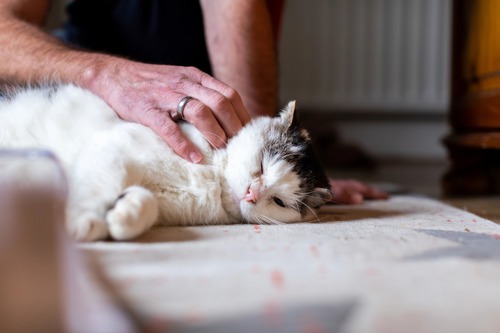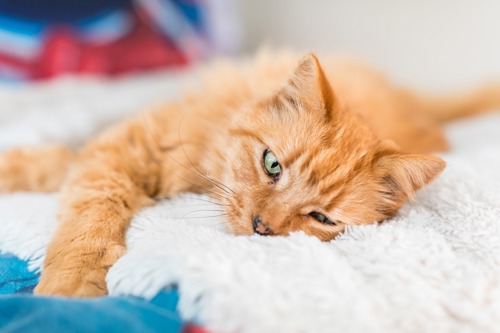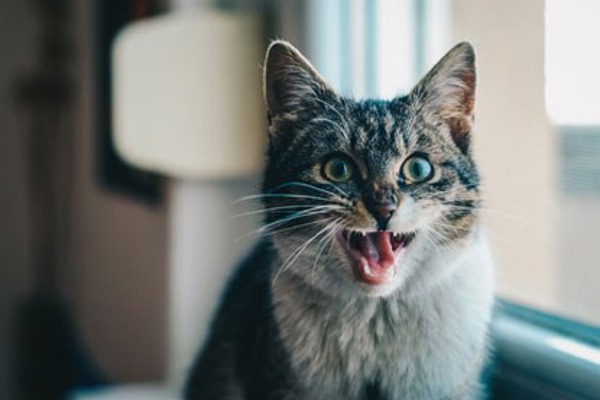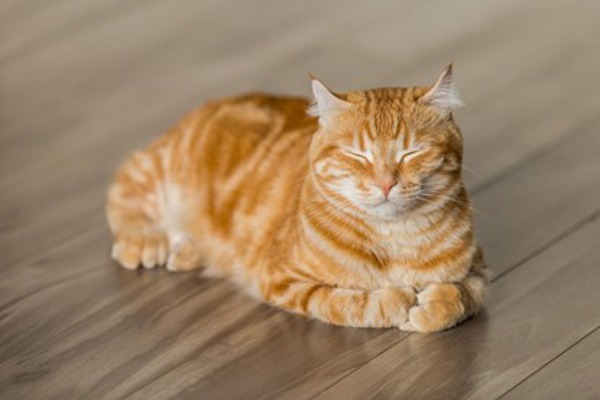Ever wondered why cats purr or why your cat does not purr? Discover the reasons cats make this soothing sound. It doesn’t necessarily mean they’re happy!
The soft, rumbling purr of a cat is certainly a happy sound for many humans. Most people assume it’s a sign their cat is relaxed. But there are many different reasons why cats purr, and they’re not all a sign that everything is right.

Why do cats purr?
The reason a cat is purring usually depends on context. Look for other clues that could show how they’re feeling. Find out more about cat body language.
- They’re feeling happy and relaxed
If your cat appears relaxed, with relaxed ears and whiskers, small pupils in their eyes, and their tail pointing up or curled around them, then their purring is most likely a sign they are happy. It could also be a sign that they want a bit of attention. Try giving them a gentle fuss. - They’re bonding with their mum
Kittens can purr from birth. They use this sound as a way to let their mum know where they are, that they’re ok and perhaps that it’s feeding time! It’s a key part of the mum-kitten bond. - They’re stimulated
If your cat is purring loudly while you are stroking them or playing with them, this is a sign that they are stimulated. This type of purring may be accompanied by kneading, drooling and licking too. It’s ok to continue your interactions with your cat, but if they start to become aggressive, perhaps biting or scratching you, then they may be overstimulated. You should leave them alone for a while to calm down. Find out more about cat aggression. - They’re feeling stressed
If your cat is purring while their ears are flat or turned to the side, their eyes are wide open with wide pupils, and their whiskers are pointing forwards or down, it’s likely that they are stressed. If your cat is purring at the vets, or while there is lots of noise and activity going on around them, this is probably the cause of their stress. If you can, try to limit or remove any stressors for your cat. Find out more about cat stress. - They’re in pain
Purring can be a sign that your cat is in pain. Look for the body language cues mentioned above to try and tell if they are happy or stressed. If they are purring a lot more than usual or in different situations than they normally would, this could be a sign that something is wrong. If you notice any change in your cat’s behaviour, take them to the vet to get them checked out. - They are self-soothing
Another possible reason for cats purring is to sooth themselves and help them heal. The low frequency vibrations of a cat’s purr are suspected to promote bone and tissue growth and lessen pain and swelling. If they’ve recently been injured or unwell, this could be a reason for their purring.
Why does my cat not purr?
While purring is a common behaviour for cats, not all cats will purr. All cats are different. Some may prefer to communicate their feelings in other ways, such as via meows or their body language. But if your cat used to purr and has suddenly stopped, or if they don’t normally purr and have suddenly started, this could show that they are unhappy or unwell. Take them to the vet for a check-up.
Why does my cat bite me while purring?
Cats can sometimes purr as a sign that they are stimulated, maybe because they are being stroked or played with. If they become overstimulated, they may suddenly grab you and bite you. If they do this, don’t punish them as this will make them stressed and could lead to other problem behaviours. Instead, try to stay calm and walk away. Leave them to calm down for a while before you give them any more attention. If this behaviour occurs frequently, try giving your cat several short bursts of play or fuss spread throughout the day. This will help to keep their stimulation levels balanced.
Can purring be healing for humans?
According to our CATS Report 2023, one of the top three reasons cat owners gave for owning a cat was to reduce stress. There’s no doubt the gentle sound and vibration of a cat purring is a good stress-reliever for humans. Purring is thought to promote bone and tissue growth in cats, and it could have the same healing powers for humans when a cat is purring on your lap. We wouldn’t recommend it as your only treatment though, so it’s best to visit a doctor if you are injured or unwell!
Do big cats purr?
Big cats, like tigers and lions, can’t purr. It’s all because of a little bone in the back of their throat called the hyoid. In small cats, like bobcats, lynxes, cheetahs, cougars and our pet cats, this bone is completely rigid. When the larynx, or voice box, vibrates, the hyroid bone reverberates to generate a low frequency rumble that we call purring. In big cats this hyoid bone is only partly rigid, meaning they can produce deep roars but not gentle purrs.




